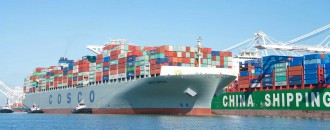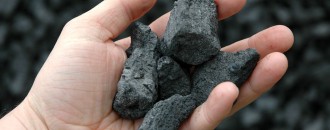
Goyal suggests PPP model to step up Indias mineral exploration
The Dollar Business Bureau Mineral exploration in the country is presently constrained due to lack of participation from the private sector, said Power, Coal, New & Renewable Energy and Mines Piyush Goyal, and suggested a public private partnership (PPP) model to provide a fillip to the mineral exploration activity. “The time is ripe to reflect on where we had gone wrong”, the Minister said while addressing a conference on ‘Indian Mining Industry 2030 - Way Forward’, organised jointly by FICCI and Ministry of Mines on Tuesday. He suggested setting up of a committee that consists of young mining aspirants for developing a position paper to expedite exploration activities. “This committee should look at innovative ways to bring down the time of actual operation of mine after it ...

Marginal growth in core sector industries; Cotton sowing pushes up Kharif sowing acreage; Forex reserves hit life-time highs
By Abin Daya Change is an unavoidable part of life - and of doing business. One of the biggest changes to the way we do business happened last Friday, with the rolling out of the GST. Yes, there will be disruptions in the short term and the cost of compliance will go up. Also, many small businesses will lose the tax arbitrage that enabled them to price below that of the larger companies. It will also increase the financing cost of business, particularly for those engaged in foreign trade. Speaking of financing, even that is not going to be easy. While credit growth is down because of low credit demand driven by the leveraged position of corporates combined with muted demand, even where businesses ...

China to ban coal imports from small ports from July 1
The Dollar Business Bureau China will ban the imports of coal from July 1 at small ports, according to a report by the state-run newspaper - China Securities Times on Wednesday. China, the world's largest coal consumer, tightens the supply of this fuel as part of its efforts to manage glut as well as smog. The move to ban coal imports is one of the latest attempts by the country to control the coal supply during summer and also to support the prices, which have fluctuated in the previous year in the wake of a series of regulations which are aimed to keep the prices of the fuel high enough so that they can support the miners. The ban will only cover tier II ports that were set up with approvals ...

Chinas exports up 8.7%, imports 14.8% in May
The Dollar Business Bureau Belying the expectations of analysts, China's exports grew 8.7% in May compared to the previous year, while imports rose 14.8%, according to an official data. With this, the country was left with a trade surplus of about $40.81 billion for May, the Chinese government agency General Administration of Customs of China on Thursday said. Exports in the month of May from the largest exporter of the world were expected to grow at 7%, easing a little from 8% growth in April, according to the analysts polled by Reuters. However, the imports into the country decreased to 8.5%, after a growth of 11.9% in the preceding month. The analysts were expecting the trade surplus of China to have expanded to $46.32 billion ...
.jpg)
GST: Luxury cars, aerated waters, cigarettes subjected to highest tax rate
By Ranjeet Mahtani & Niraj Hande The most crucial GST Council meeting took place on 18th and 19th May, 2017 in Srinagar, Jammu and Kashmir. The GST Council has finalised seven sets of GST Rules and completed the fitment of most goods and services in various tax brackets in the last two days. Rules The GST Council has approved seven sets of GST Rules which pertain to Composition, Tax Invoice Credit & Debit Notes,Input Tax Credit, Payment of Tax, Refund, Registration and Determination of Value of Supply. The Rules pertaining to Transition and Returns were not finalised and shall require further vetting before approval. The next step will be for Governments, State and Central to now notify these. Rates The GST Council has ...

The week that was: oil, sugar and core sector growth
By Abin Daya It is very rare that you will find a month in which all the 8 core sector industries have had positive growth. No, it did not happen in Feb 2017; but it happened a year back – in Feb 2016! Before that it happened in 2010 – that too, three months in a row! In the case of Feb 2016, what made the month even more special was that 4 out of 8 core sector industries grew in double digits! Understandably, when something like that happens, you expect a significantly high rate of growth for the sector. Core sector grew at 9.4% in Feb 2016. Compare that with the core sector performance a year later, in Feb 2017. Such a ...

Coal India zeroes in on Australia and South Africa for acquisitions
The Dollar Business Bureau Emboldened by inflated valuations due to doubling of coking coal prices in the previous year, Coal India Ltd. (CIL) had announced plans to explore coking coal assets in US, Colombia, South Africa, Indonesia and Australia. It has been reported that CIL has now zeroed in on Australia and South Africa for foreign acquisitions. The logistical advantage of shipping coal from Australia due to its proximity makes the country favourable over US or South Africa. The government-owned coal giant started exploring opportunities outside India in January 2017, via its subsidiary Coal Videsh. Lack of technological wherewithal required to build domestic reserves prompted the public sector coal miner to explore opportunities abroad in January 2017. CIL has two routes ...

Indias core sector growth in January slips to 5-month low
The Dollar Business Bureau India’s core industries grew at a slower pace in January as a contraction in the production of refinery products, cement and fertilizer weighed. The overall growth fell to a five-month low at 3.4% in the month, the slowest since August last year, when the sectors had witnessed a growth rate of 3.2%. In January 2016, the rate of growth in eight infrastructure sectors of coal, natural gas, crude oil, refinery products, steel, fertilisers, electricity and cement was 5.7%, while in December 2016, it was 5.6%. The production of refinery products, cement and fertiliser declined by 1.5%, 13.3% and 1.6%, respectively, in the month of January. Coal and electricity sectors expanded at 4.8% during the month under review, compared to 7.9% ...


